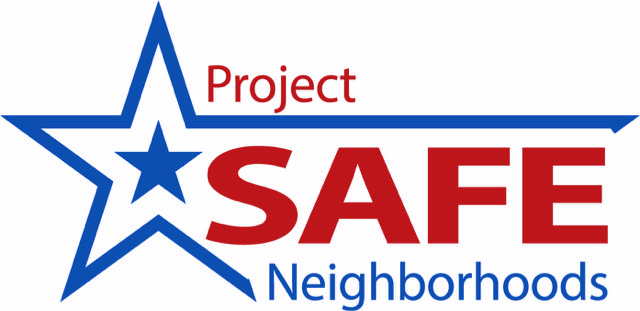About PSN
-
What is Project Safe Neighborhood?
Project Safe Neighborhoods (PSN) is a nationwide commitment to reduce gun and gang crime in the United States at the local level. The core of PSN involves the funding of local programs coupled with increased federal prosecution of illegal gun use and possession. Since its inception in 2001, over $2 billion has been committed to this initiative. This funding is being used to hire new federal and state prosecutors, support investigators, provide training, deter juvenile gun crime, and develop and promote community outreach efforts, as well as to support other gun crime and gang violence reduction strategies.
Each year, the 94 U.S. Attorney districts are eligible to apply for PSN grants to develop and sustain five elements that build on the original program components:
- Leadership
- Partnership
- Targeted
- Enforcement
- Prevention
- Accountability
PSN proposed to increase partnerships between federal, state, and local law enforcement agencies through the formation of a local gun crime reduction task force. Additionally, PSN encouraged establishing partnerships with other sectors of local government, social services, community groups, and citizens to increase resources for gun crime prevention components as well as to increase the legitimacy of interventions. PSN included a significant commitment of resources to support training and community outreach.
The strategic planning and problem solving component of PSN was designed to help jurisdictions tailor PSN to the local context. Specifically, PSN provided resources for the inclusion of a research partner. The research partner would work with the PSN task force to analyze the local gun crime problem and to share the findings with the task force for the development of a proactive plan for gun crime reduction. The research partner would also assist in the ongoing assessment of the program implementation, provide feedback to the task force, and conduct an evaluation.
Inclusion of a research partner in a large scale crime reduction effort prior to PSN was rare. Historically speaking, researchers have been outsiders in the problem solving process. That is, they have been observers, not participants, in criminal justice program development and implementation. And, more commonly than not, researchers were brought in as independent evaluators of impact after the program or initiative had started, or even ended. In the best situation, the researchers were able to produce an evaluation that informed the scientific community and provided an after-the-fact assessment of impact for criminal justice professionals. All too often, however, these circumstances created an environment not conducive to a well done evaluation, no feedback to support effective implementation, and typically left all parties involved dissatisfied.
In the mid-1990s, the paradigm began to shift. With support from the National Institute of Justice, specifically Lois Felson Mock, we began to see active and ongoing partnerships between researchers and law enforcement agencies. The research process started playing a role in helping to solve local problems. This process is summarized by four steps:
- Data collection to identify and understand problems
- Strategic analysis to develop targeted interventions
- Program monitoring and feedback for refinement
- Assessment of impact
PSN again became a formula funded program in FY2018. The resurgence brought about a larger need for training and technical assistance. MSU joined a larger collaboration of TTA proviers to meet national needs. Additional information of this expansion can be found at psntta.org
After more than 15 years of experience the PSN model is intact and has been recognized as a “Promising Program”.

-
Contact Us
Edmund F. McGarrell, Ph.D.
Principal Investigator/Professor
Michigan State University
School of Criminal Justice
East Lansing, MI 48824
Email: mcgarrel@msu.edu
Heather Perez, M.A.
PSN National Technical Assistance Coordinator
Michigan State University
School of Criminal Justice
East Lansing, MI 48824
Phone: (317) 341-3230
Email: perezh@msu.edu
-
Highlights from the Field
Innovative and evidence-based gun and gang crime reduction strategies are occurring in communities across the country through Project Safe Neighborhoods (PSN). These include enforcement, intervention, prevention, and community building strategies.

Detroit PSN is focused on the city’s 8th precinct due to historic and current levels of gun and gang violence. Detroit PSN leverages multiple resources to support a comprehensive strategy that includes a focused deterrence approach to gang and group violence (Detroit Ceasefire) coupled with street outreach and services; long-term gang investigations conducted by a local-federal task force; joint federal-local prosecution screening of gun cases; school-based prevention; and a unique police-business partnership aimed at place-based violence prevention (Detroit Greenlight).

Fort Worth PSN also employs a comprehensive and data-driven approach to gun, gang, and family violence reduction. Through an established relationship with an embedded research partner, Fort Worth PSN utilizes a variety of analytical tools to provide strategic and tactical intelligence on the drivers of gun and gang violence. An innovative finding from these analyses is the overlap between gun and gang violence with domestic violence and child maltreatment. This has resulted in a collaboration between PSN and the Cook Children’s Center for the Prevention of Child Maltreatment so that highly focused prevention efforts can be coupled with the PSN enforcement and intervention strategies.

In Memphis, a GunStat model is utilized to identify the most prolific repeat violent offenders in gun crime hotspots and to coordinate proactive enforcement and highly focused prosecution. The Memphis PSN GunStat approach emphasizes team accountability by monitoring people and places involved in gun crime, tracking cases from arrest through prosecution, and working with the research partner to track impact at the level of individual offenders as well as community trends in violent crime.
Violent Crime Reduction Workshop
During PSN competitive funding (FY2012-FY2017), Michigan State University, School of Criminal Justice, as a PSN Training and Technical Assistance provider hosted seven Violent Crime Reduction Workshops as an introduction to the PSN model for nearly 288 participants from 97 sites.
The two-day Workshop built on the action research model, establishing strong and value-added research partnerships, and effective implementation. The Workshop employed adult-learning principles and included the “cultural” dimensions of effective research partnerships, information about cutting-edge, evidence-based/informed and innovative strategies, and skills-building modules. A minimum of one practitioner, generally the Project Coordinator or primary point of contact, and the research partner attended as a "team". The Workshop was a required training as a newly funded PSN sites.
The sites completed the Violence Reduction Assessment Tool prior to attendance at the Workshop. Teams would receive their Assessment feedback at the Workshop. The feedback was then incorporated in their Strategic Action Plan during and post-Workshop. The Strategic Action Plan was used to guide a site's PSN efforts over the course of the grant period.
Archive
-
FY17- Omaha, NE
May 16-17, 2018
Barbara Weitz Community Engagement Center, University of Nebraska Omaha
Omaha, NebraskaHighlights:
- Robyn Thiemann, Associate Deputy Attorney General, U.S. Department of Justice presents "Past, Present, and Future of PSN"
- Violence Reduction with Community Engagement
- National Integrated Ballistics Information Network: Making NIBIN of Value At The Local Level (ATF)
- Procedurally Just Policing: Challenges and Key Concerns
- Reporting Requirements/SAP Refinement/TeamTime/Next Steps/Sustainability
Agenda
-
FY16- Denver, CO
April 12-13, 2017
Highlights:
Hilton Garden Inn
Denver, Colorado- Atlanta and Tampa’s Experience Developing Chronic Violent Offender Programs
- The Crime Gun Intelliegence Center-Denver, National Integrated Ballistic Information Network and Shotspotter
- Researchers: Techniques on Analysis--How Do You Conduct Social Network Analysis and Risk Terrain Modeling
- Practitioners: Life Cycle Of A Grant: Planning, Implementation, Evaluation, Sustainability
-
FY15- Kansas City, MO
April 12-13, 2016
Kansas City Marriott Downtown
Kansas City, MissouriHighlights:
- Social Network Analysis: Understanding the Crime Problem & Targeting Strategies
- Intelligence Driven Strategies for Reducing Gun, Gang, and Drug Market Violence/Domestic Violence Offender-Based Focused Deterrence Model -The High Point Experience
- Homicide and Non-Fatal Shooting Incident Reviews
- National Integrated Ballistic Information Network (NIBIN)
Agenda -
FY14- Phoenix, AZ
March 31- April 1, 2015
Hilton Phoenix Suites
Phoenix, ArizonaHighlights:
- Making It Work: The Role of The Research Partner and An Effective Partnership
- Ongoing Training, Technical Assistance, and Support
- Social Network Analysis: Understanding the Crime Problem & Targeting Strategies
- National Integrated Ballistic Information Network (NIBIN)
Agenda -
FY13- Nashville, TN
June 10-11, 2014
Double Tree by Hilton Hotel Nashville Downtown
Nashville, TennesseeHighlights:
- The Research Partner Model
- Making It Work: The Role of The Research Partner and An Effective Partnership
- Ongoing Training, Technical Assistance, and Support
- Violence Reduction Assessment Tool (VRAT)
Agenda -
FY12- Nashville, TN
March 26-27, 2013
Courtyard Nashville Downtown
Nashville, TennesseeHighlights:
- Guided Group work by Discipline and Site
- Making It Work: The Role of The Research Partner and An Effective Partnership
- Background on Research Partnerships
- Ongoing Training, Technical Assistance, and Support
- Violence Reduction Assessment Tool (VRAT)
-
FY11- Beaumont, Texas- PILOT WORKSHOP
July 10-11, 2012
Lamar University
Beaumont, TexasHighlights:
- Background on Research Partnerships
- The Research Partner Model
- Making It Work: The Role of The Research Partner and An Effective Partnership
- Ongoing Training, Technical Assistance, and Support
- Intelligence Driven Strategies for Reducing Gun, Gang, and Drug Market Related Violence

